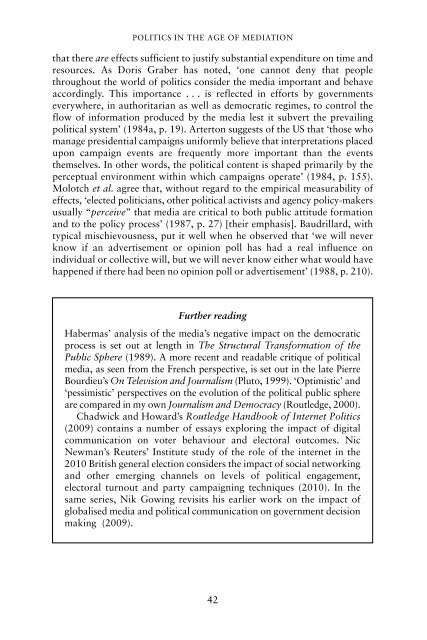20130412164339753295_book_an-introduction-to-political-communication
20130412164339753295_book_an-introduction-to-political-communication
20130412164339753295_book_an-introduction-to-political-communication
Create successful ePaper yourself
Turn your PDF publications into a flip-book with our unique Google optimized e-Paper software.
POLITICS IN THE AGE OF MEDIATION<br />
that there are effects sufficient <strong>to</strong> justify subst<strong>an</strong>tial expenditure on time <strong>an</strong>d<br />
resources. As Doris Graber has noted, ‘one c<strong>an</strong>not deny that people<br />
throughout the world of politics consider the media import<strong>an</strong>t <strong>an</strong>d behave<br />
accordingly. This import<strong>an</strong>ce . . . is reflected in efforts by governments<br />
everywhere, in authoritari<strong>an</strong> as well as democratic regimes, <strong>to</strong> control the<br />
flow of information produced by the media lest it subvert the prevailing<br />
<strong>political</strong> system’ (1984a, p. 19). Arter<strong>to</strong>n suggests of the US that ‘those who<br />
m<strong>an</strong>age presidential campaigns uniformly believe that interpretations placed<br />
upon campaign events are frequently more import<strong>an</strong>t th<strong>an</strong> the events<br />
themselves. In other words, the <strong>political</strong> content is shaped primarily by the<br />
perceptual environment within which campaigns operate’ (1984, p. 155).<br />
Molotch et al. agree that, without regard <strong>to</strong> the empirical measurability of<br />
effects, ‘elected politici<strong>an</strong>s, other <strong>political</strong> activists <strong>an</strong>d agency policy-makers<br />
usually “perceive” that media are critical <strong>to</strong> both public attitude formation<br />
<strong>an</strong>d <strong>to</strong> the policy process’ (1987, p. 27) [their emphasis]. Baudrillard, with<br />
typical mischievousness, put it well when he observed that ‘we will never<br />
know if <strong>an</strong> advertisement or opinion poll has had a real influence on<br />
individual or collective will, but we will never know either what would have<br />
happened if there had been no opinion poll or advertisement’ (1988, p. 210).<br />
Further reading<br />
Habermas’ <strong>an</strong>alysis of the media’s negative impact on the democratic<br />
process is set out at length in The Structural Tr<strong>an</strong>sformation of the<br />
Public Sphere (1989). A more recent <strong>an</strong>d readable critique of <strong>political</strong><br />
media, as seen from the French perspective, is set out in the late Pierre<br />
Bourdieu’s On Television <strong>an</strong>d Journalism (Plu<strong>to</strong>, 1999). ‘Optimistic’ <strong>an</strong>d<br />
‘pessimistic’ perspectives on the evolution of the <strong>political</strong> public sphere<br />
are compared in my own Journalism <strong>an</strong>d Democracy (Routledge, 2000).<br />
Chadwick <strong>an</strong>d Howard’s Routledge H<strong>an</strong>d<strong>book</strong> of Internet Politics<br />
(2009) contains a number of essays exploring the impact of digital<br />
<strong>communication</strong> on voter behaviour <strong>an</strong>d elec<strong>to</strong>ral outcomes. Nic<br />
Newm<strong>an</strong>’s Reuters’ Institute study of the role of the internet in the<br />
2010 British general election considers the impact of social networking<br />
<strong>an</strong>d other emerging ch<strong>an</strong>nels on levels of <strong>political</strong> engagement,<br />
elec<strong>to</strong>ral turnout <strong>an</strong>d party campaigning techniques (2010). In the<br />
same series, Nik Gowing revisits his earlier work on the impact of<br />
globalised media <strong>an</strong>d <strong>political</strong> <strong>communication</strong> on government decision<br />
making (2009).<br />
42
















